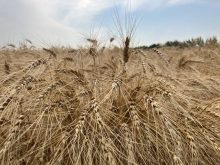Saskatchewan farmers hoping to catch up with seeding after being pelted with rain last week have caught a break on their seeding deadlines for crop insurance coverage.
The provincial and federal governments on Thursday announced insured farmers in areas with longer growing seasons, such as the west-central, Moose Jaw and Estevan areas, will now be able to seed their crops by June 20 and still retain coverage from Saskatchewan Crop Insurance Corp.
The extension in those regions applies to all crops except chickpeas.
In the rest of the province, meanwhile, Crop Insurance customers have now been granted full yield-loss coverage on any crop — again, except chickpeas — if it’s seeded by June 15. Those customers can also seed and insure barley, oats, mustard, peas and Polish canola up to June 20.
Read Also

ICE weekly: China, soy complex lift canola prices
China’s upcoming lifting of tariffs and rising soyoil prices lifted Canadian canola values for the week ended Feb. 4, 2026.
If SCIC customers still can’t seed by the new deadlines, they can claim SCIC’s unseeded acreage benefit as of June 20. That benefit provides $50 per eligible claim acre to Crop Insurance customers on acres too wet to seed.
Customers also must submit their seeded acreage reports (SARs) and stored grain declarations to SCIC by June 25.
“We recognize that seeding is well behind average across the province with excess moisture preventing producers from getting into the fields,” provincial Agriculture Minister Bob Bjornerud, a southeastern Saskatchewan MLA, said in the joint government release.
“While I hope this extension will help producers get their seed in the ground and still be insured, we all realize the best solution to this situation would be some warm, dry weather.”
“This has been one of the wettest years on record in rural Saskatchewan and has caused major seeding delays in many parts of the province,” Greg Marshall, a producer at Semans, Sask. and president of the Agricultural Producers Association of Saskatchewan, said in the government release.
“We are pleased Crop Insurance is being flexible and extending these deadlines to help address the needs of producers.”
“Agricultural programs must work at the farm gate and when the current rain pushed seeding beyond application deadlines, the deadlines had to change,” federal Agriculture Minister Gerry Ritz, a western Saskatchewan MP, said in the same release.














